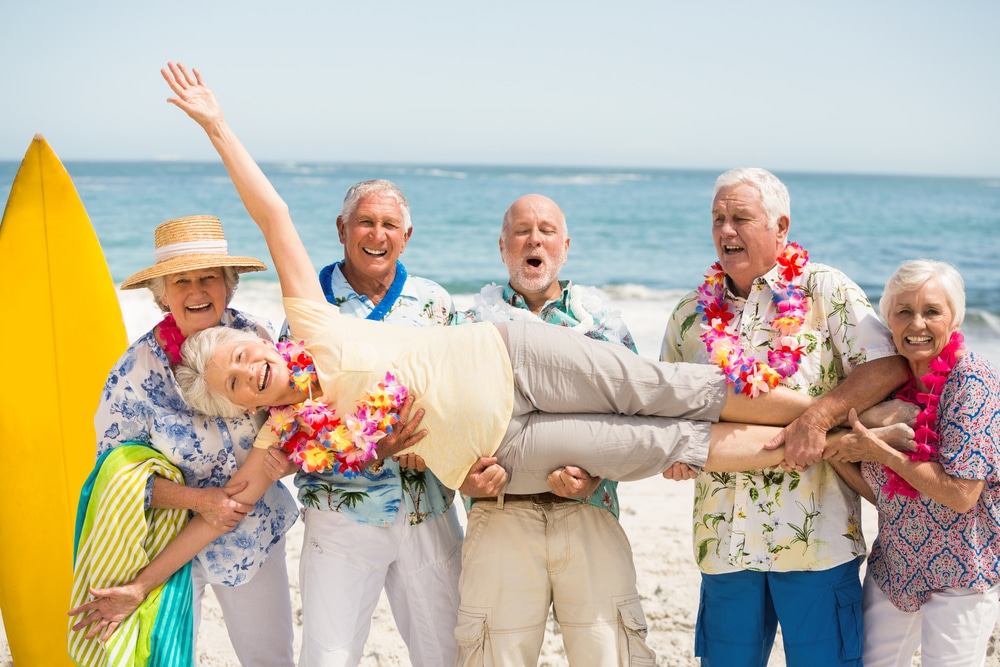Vacations for senior citizens offer a unique opportunity to explore the world, relax, and create lasting memories. This guide delves into the planning process, addressing crucial aspects from budgeting and health considerations to choosing the right destination and ensuring accessibility. Whether you envision an adventurous expedition or a tranquil retreat, we’ll help you craft a memorable and fulfilling journey tailored to your needs and preferences.
We’ll cover various vacation types, from cruises and all-inclusive resorts to independent travel, highlighting the advantages and disadvantages of each. Financial planning, including budgeting and securing affordable deals, will also be discussed, alongside essential information on health and wellness, accessibility, and companionship. Ultimately, this guide aims to empower senior citizens to plan and enjoy vacations that are both enriching and stress-free.
Types of Vacations for Senior Citizens
Choosing the right vacation is crucial for seniors, ensuring a memorable and enjoyable experience while considering physical capabilities and preferences. A well-planned trip can offer relaxation, rejuvenation, and the creation of lasting memories. This section explores various vacation types catering to diverse needs and interests within the senior demographic.
Vacation Types Categorized by Activity Level and Accessibility
The following table outlines several vacation options, categorized by activity level, cost, and special considerations for senior travelers. Careful consideration of these factors will help ensure a comfortable and fulfilling trip.
| Destination | Activity Level | Cost Range | Special Considerations |
|---|---|---|---|
| Relaxing Beach Resort (e.g., Florida Keys, Hawaii) | Low | Mid-range to High | Accessibility features (ramps, elevators), proximity to medical facilities, shaded areas, comfortable seating. |
| All-Inclusive Resort (e.g., Riviera Maya, Mexico; Dominican Republic) | Low to Moderate | Mid-range to High | Ease of access to amenities, readily available assistance, varied dining options catering to dietary needs. |
| Cruise (e.g., Caribbean, Mediterranean) | Low to Moderate | Mid-range to High | Accessibility features on the ship (ramps, elevators, accessible cabins), shore excursions tailored to mobility levels, medical facilities onboard. |
| National Park Tour (e.g., Yellowstone, Grand Canyon) | Low to High (depending on chosen activities) | Mid-range to High | Consider accessibility of trails and attractions, pre-booking tours with accessible transportation, choosing less strenuous activities. |
| European River Cruise | Low to Moderate | High | Easy embarkation and disembarkation, accessible onboard amenities, guided tours with manageable walking distances. |
| Train Journey (e.g., Amtrak across the US, Canadian Rockies) | Low | Mid-range to High | Comfortable seating, accessible restrooms, scenic views, limited physical exertion. |
| Spa Resort (e.g., Sedona, Arizona; Napa Valley, California) | Low | High | Relaxing atmosphere, therapeutic treatments, accessible facilities, quiet and peaceful environment. |
Advantages and Disadvantages of Different Travel Styles
Each travel style presents unique advantages and disadvantages for senior travelers. Careful consideration of these factors will lead to a more satisfying travel experience.
Cruises: Advantages include all-inclusive options, varied onboard activities, and convenient transportation between destinations. Disadvantages can include potential seasickness, limited shore excursion options for those with mobility issues, and crowds.
All-inclusive Resorts: Advantages include ease of budgeting, readily available amenities, and a relaxed atmosphere. Disadvantages may include limited exploration beyond the resort, potential for feeling isolated, and a lack of cultural immersion.
Independent Travel: Advantages include flexibility, personalized itineraries, and a deeper cultural immersion. Disadvantages can include more planning and logistical challenges, potential for higher costs, and greater reliance on personal physical capabilities.
Budgeting and Financial Considerations
Planning a vacation, especially for seniors, requires careful budgeting to ensure a relaxing and enjoyable experience without exceeding financial limits. A well-structured budget considers all aspects of the trip, from initial travel costs to unforeseen expenses. Failing to account for all potential costs can lead to financial stress during what should be a relaxing time.
Creating a realistic budget is crucial for stress-free travel. Unexpected costs can quickly derail even the most meticulously planned trip. Therefore, proactive planning is key to a financially sound vacation.
Sample Senior Citizen Vacation Budget
This sample budget assumes a 7-day trip for one person. Adjust amounts based on your chosen destination, travel style, and personal preferences. Remember that prices are estimates and can vary significantly depending on the time of year and specific choices.
| Expense Category | Estimated Cost |
|---|---|
| Airfare/Transportation | $500 – $1500 (depending on destination and booking time) |
| Accommodation (7 nights) | $700 – $1400 (ranging from budget-friendly motels to mid-range hotels) |
| Activities and Entertainment | $350 – $700 (including tours, museum entries, shows, etc.) |
| Meals (7 days) | $350 – $700 (consider a mix of dining in and eating out) |
| Travel Insurance | $100 – $200 (essential for medical emergencies and trip cancellations) |
| Miscellaneous Expenses (souvenirs, tips, etc.) | $100 – $200 |
| Total Estimated Cost | $2100 – $4700 |
Finding Affordable Travel Deals and Senior Discounts
Several strategies exist to reduce travel expenses. Taking advantage of senior discounts and off-season travel can significantly lower the overall cost. Websites specializing in travel deals for seniors are also invaluable resources.
Many airlines, hotels, and tour operators offer discounts for senior citizens. AARP (American Association of Retired Persons) and similar organizations often provide members with exclusive travel deals and discounts. Websites like Expedia, Kayak, and Priceline allow for price comparison across various providers, helping travelers find the best deals. Booking flights and accommodations well in advance can also lead to significant savings.
Managing Travel Insurance and Potential Medical Emergencies
Comprehensive travel insurance is crucial for senior citizens. It provides financial protection against unforeseen events such as medical emergencies, trip cancellations, and lost luggage. Policies should cover medical expenses, evacuation costs, and repatriation.
Before embarking on a trip, seniors should review their existing health insurance coverage to understand its limitations while traveling. They should also consult their physician regarding any necessary vaccinations or precautions for their destination. A detailed itinerary, including contact information for emergency services and family members, should be readily accessible throughout the trip.
Health and Wellness Aspects
Planning a vacation, especially for senior citizens, requires careful consideration of health and wellness. Maintaining a healthy and safe travel experience involves proactive planning and preparation to mitigate potential risks associated with travel. Understanding potential health concerns and taking appropriate preventative measures is crucial for a fulfilling and enjoyable trip.
Senior travelers may face unique health challenges while on vacation. Changes in altitude, climate, and routine can exacerbate existing conditions or trigger new ones. The increased physical activity involved in sightseeing and travel can also strain the body. Therefore, a proactive approach to health management is essential.
Potential Health Concerns and Preventative Measures
Several health concerns are more prevalent among senior travelers. These include cardiovascular issues, respiratory problems, mobility limitations, and medication management challenges. Preventative measures should address these concerns directly. For example, individuals with heart conditions should consult their doctor before traveling to high altitudes or engaging in strenuous activities. Those with respiratory issues should pack necessary inhalers and medications, and potentially consider destinations with cleaner air. Planning for adequate rest and avoiding overexertion are crucial for managing mobility limitations. Proper medication management requires careful organization and consideration of potential time zone changes and access to pharmacies.
Importance of Travel Insurance
Comprehensive travel insurance is paramount for senior travelers. It provides financial protection against unexpected medical emergencies and evacuations, which can be significantly more expensive for older individuals. Policies often cover medical expenses incurred abroad, emergency medical evacuations (which can cost tens of thousands of dollars), and trip cancellations or interruptions due to illness. The peace of mind offered by knowing that medical costs are covered allows for a more relaxed and enjoyable vacation. Consider policies that specifically address pre-existing conditions to ensure adequate coverage.
Essential Health Documents and Medications
Carrying essential health documents and medications is critical for senior travelers. This ensures access to necessary care and prevents potential complications. It is recommended to maintain a readily accessible, organized system for these items.
- A copy of your medical history, including any allergies and pre-existing conditions.
- A list of all current medications, including dosages and frequencies.
- Copies of prescriptions and doctor’s contact information.
- Your health insurance card and travel insurance policy information.
- Emergency contact information for family and friends.
- Copies of your passport and other identification documents.
Accessibility and Accommodation
Planning a vacation that caters to the specific needs of senior citizens is crucial for ensuring a comfortable and enjoyable experience. Accessibility and suitable accommodations are paramount, impacting both the ease and safety of travel. Careful consideration of these factors can transform a potentially stressful trip into a memorable adventure.
Choosing accessible accommodations and transportation is key to a smooth and enjoyable trip for seniors with mobility issues. Several factors must be considered to ensure comfort and safety throughout the journey.
Accessible Accommodations
Many hotels and resorts now offer a range of accessible rooms and facilities. These typically include features such as roll-in showers, grab bars in bathrooms, wider doorways, and ramps for wheelchair access. Some establishments even provide adaptive equipment like raised toilet seats upon request. For example, chains like Marriott and Hilton offer comprehensive accessibility features across many of their properties, often detailed on their websites. Independent hotels and smaller resorts may also offer accessible rooms; it is essential to contact them directly to inquire about specific features and availability. When booking, explicitly mention any accessibility requirements to ensure a suitable room is reserved.
Accessible Transportation
Transportation options for seniors with mobility challenges are equally important. Many airports and train stations provide accessible facilities, including ramps, elevators, and designated seating areas. Transportation services such as taxis and ride-sharing apps often offer wheelchair-accessible vehicles, but booking in advance is recommended to guarantee availability. Cruise lines also offer accessible cabins and onboard facilities. For example, some cruise lines offer specialized wheelchairs and other mobility aids. Exploring public transportation options within the chosen destination is also advisable. Many cities have accessible bus and train services, but checking timetables and route accessibility beforehand is necessary.
Resources for Finding Senior-Friendly Hotels and Resorts
Several online resources can assist in locating senior-friendly accommodations. Websites specializing in accessible travel often feature detailed reviews and ratings from other travelers with mobility issues. These platforms allow users to filter search results based on specific accessibility needs, such as wheelchair accessibility or the availability of grab bars. Travel agents specializing in senior travel can also be invaluable, offering personalized recommendations and assistance with booking. They often have extensive knowledge of accommodations that cater to the specific needs of older travelers, including those with mobility issues. Reading online reviews from other senior travelers can also provide valuable insights into the accessibility of a particular hotel or resort.
Importance of Nearby Healthcare Facilities
Selecting a destination with readily accessible healthcare facilities is crucial, particularly for seniors with pre-existing health conditions. Emergencies can arise unexpectedly, and proximity to hospitals, clinics, or urgent care centers can be a significant factor in ensuring timely and appropriate medical attention. Before booking a vacation, research the location of nearby medical facilities and consider the availability of emergency medical services. Knowing the location of pharmacies and the availability of specific medications can also contribute to peace of mind. Travel insurance that covers medical emergencies should also be considered.
Companionship and Social Aspects
For senior citizens, travel isn’t just about seeing new places; it’s about enriching life experiences and fostering connections. The social benefits of travel are significant, particularly for those who may be experiencing social isolation or reduced mobility. Choosing the right travel style can significantly impact the level of companionship and social interaction enjoyed during a vacation.
The advantages of shared travel experiences are numerous, especially when considering the unique needs of senior travelers. Group tours and escorted travel offer a built-in support system and opportunities for socializing, reducing feelings of loneliness and enhancing the overall enjoyment of the trip.
Benefits of Group Tours and Escorted Travel
Group tours and escorted travel offer several key advantages for seniors traveling alone or with limited mobility. The structured itinerary eliminates the stress of planning and navigation, allowing seniors to focus on enjoying the experience. Furthermore, the presence of a tour guide and fellow travelers provides a sense of security and companionship, particularly valuable for those who may feel apprehensive about traveling independently. The social interaction inherent in group travel can combat loneliness and boost morale, leading to a more fulfilling vacation. For example, a guided tour of Europe might include planned group dinners, allowing seniors to connect with others over shared experiences and create lasting memories. Similarly, a cruise offers numerous opportunities for social interaction, from onboard activities to shore excursions. The constant presence of fellow travelers and staff provides a reassuring sense of community.
Finding Travel Companions with Shared Interests
Connecting with like-minded individuals before embarking on a trip can greatly enhance the social aspect of the vacation. Several avenues exist for finding travel companions. Senior-focused online forums and social media groups dedicated to travel offer platforms to connect with potential travel buddies. These platforms often allow users to filter by interests, travel style, and destination preferences, making it easier to find compatible companions. Local senior centers and community organizations frequently organize group trips, providing a pre-vetted group of potential travel companions with shared interests. Consider joining a travel club or interest group related to a specific hobby or activity, such as hiking, photography, or history, to connect with people who share your passions and travel preferences. These groups often organize trips specifically designed for their members, ensuring a shared interest and travel style amongst participants. For instance, a photography club might organize a trip to a national park, offering a shared activity and opportunity for socializing amongst participants with similar interests.
Social Aspects of Different Vacation Types
The social dynamics of a vacation vary considerably depending on the type of trip chosen. A river cruise, for example, offers a more intimate and social setting compared to a large resort. The smaller size of a riverboat allows for more interaction with fellow passengers and crew. In contrast, a large resort, while offering a wide array of amenities, may present fewer opportunities for spontaneous social interaction. Similarly, a guided walking tour of a historical city fosters social engagement through shared exploration and discussion, while a self-guided tour might offer more solitude. Choosing a vacation type that aligns with your desired level of social interaction is crucial for maximizing the overall enjoyment of the trip. For example, a senior interested in fostering social connections might prefer a small group tour focusing on cultural immersion, allowing for deeper interaction with both fellow travelers and local communities. Conversely, a senior prioritizing relaxation and personal reflection might opt for a quiet beach vacation with limited structured activities.
Packing and Preparation
Planning ahead is crucial for a smooth and enjoyable senior citizen vacation. Proper packing and preparation minimize stress and ensure a comfortable trip, allowing you to focus on relaxation and exploration. Careful consideration of specific needs and potential challenges will contribute to a more positive travel experience.
Packing Essentials for Senior Citizens
A well-organized packing list is essential. This list should account for potential health concerns and the need for easy access to important items. Consider packing light to minimize the burden of carrying luggage.
- Medications: Pack a sufficient supply of all prescription and over-the-counter medications, including a copy of your prescriptions. Carry medications in their original containers with labels clearly visible. Consider carrying a small, portable first-aid kit as well.
- Clothing: Pack comfortable, loose-fitting clothing suitable for the climate. Include layers for varying temperatures. Choose easy-to-wear garments, such as pullovers and slip-on shoes.
- Toiletries: Pack travel-sized toiletries to comply with airline regulations. Include essential items such as toothbrush, toothpaste, soap, shampoo, and any personal care products.
- Documents: Carry copies of your passport, driver’s license, insurance cards, and any necessary travel documents. Store these separately from the originals for safety.
- Personal Items: Pack any personal items that provide comfort and familiarity, such as a favorite book, comfortable blanket, or small pillow.
- Walking Aids: If you use a cane, walker, or wheelchair, ensure it is properly packed and readily accessible during travel.
- Electronics: Pack any necessary electronic devices, such as a cell phone, tablet, or e-reader. Include chargers and adapters for different power outlets.
Preparing for Safe and Comfortable Travel
Prior to departure, several steps can greatly enhance safety and comfort during the trip. This includes pre-trip medical check-ups and notifications to relevant parties.
- Medical Consultation: Schedule a pre-trip checkup with your doctor to discuss any potential health concerns related to travel. Discuss any necessary vaccinations or precautions.
- Emergency Contacts: Provide emergency contact information to family members, friends, and your doctor. Ensure someone is aware of your travel itinerary.
- Travel Insurance: Consider purchasing comprehensive travel insurance to cover medical emergencies, trip cancellations, and lost luggage.
- Transportation Arrangements: Pre-book transportation to and from the airport or train station. Consider using wheelchair assistance if needed.
- Accommodation Considerations: Choose accommodations that are accessible and meet your specific needs, such as elevators, grab bars, and ramps.
Managing Medications and Personal Care Items During Travel
Properly managing medications and personal care items while traveling is essential for maintaining health and well-being. This includes organization and awareness of potential temperature fluctuations.
- Medication Organization: Organize medications in a clear, labeled container. Keep a separate list of medications and dosages.
- Temperature Sensitivity: Be aware of temperature sensitivity of medications and store them accordingly. Avoid extreme heat or cold.
- Personal Care Items: Pack personal care items in a leak-proof bag to prevent spills.
Illustrative Examples of Senior-Friendly Vacations
Choosing the right vacation is crucial for seniors, ensuring a balance of enjoyment, comfort, and safety. The following examples showcase diverse options catering to varying interests and physical capabilities, highlighting how accessibility and thoughtful planning can create unforgettable experiences.
Adventurous Alaskan Cruise
An Alaskan cruise offers a blend of breathtaking scenery and manageable adventure. This option prioritizes ease of access and minimizes strenuous activities while maximizing awe-inspiring views.
- Scenic Cruises: Imagine gliding through pristine fjords, witnessing majestic glaciers calving into the sea, and spotting whales breaching the surface. The ship acts as a comfortable base, eliminating the need for extensive travel between locations. Many cruise lines offer accessible cabins and shore excursions designed for varying mobility levels.
- Wildlife Viewing: From the deck or on organized shore excursions, observe bears fishing for salmon, eagles soaring overhead, and playful otters frolicking in the water. These activities are often viewed from easily accessible viewpoints or aboard comfortable tour boats.
- Relaxing onboard amenities: Spend time enjoying the ship’s amenities, including spa treatments, comfortable lounges, and engaging lectures. This provides periods of rest and relaxation, allowing seniors to pace themselves throughout the journey.
This cruise caters to seniors by offering a balance of exciting experiences and comfortable relaxation, minimizing physical exertion while maximizing scenic beauty and wildlife encounters.
Relaxing Tuscan Villa Stay
A stay at a charming villa in Tuscany provides a tranquil escape focused on relaxation, culinary delights, and cultural immersion at a slower pace.
- Peaceful surroundings: Picture waking up to the sound of birdsong in a picturesque Tuscan countryside, enjoying leisurely breakfasts overlooking rolling hills dotted with vineyards and cypress trees. The villa itself offers a calm and comfortable atmosphere, with easy access to amenities.
- Culinary experiences: Participate in hands-on cooking classes focusing on regional specialties, savoring authentic Tuscan cuisine, and enjoying wine tastings at local vineyards. These activities are tailored to be relaxed and enjoyable, with minimal physical demands.
- Gentle exploration: Take leisurely strolls through nearby villages, exploring charming streets, admiring historical architecture, and soaking up the local atmosphere. Transportation can be arranged for longer distances, ensuring comfort and convenience.
This vacation emphasizes relaxation and cultural immersion, providing a slower pace of travel and minimizing physical demands while maximizing opportunities for enjoyment and relaxation.
Culturally Rich Exploration of Kyoto, Japan
Kyoto offers a rich cultural experience with manageable travel and many accessible sites, blending history, art, and serene gardens.
- Temples and Shrines: Explore iconic temples like Kinkaku-ji (Golden Pavilion) and Kiyomizu-dera, admiring stunning architecture and serene gardens. Many sites offer accessible pathways and ramps, making them easier to navigate for seniors with mobility challenges.
- Traditional Gardens: Wander through beautifully manicured gardens like Ryoan-ji’s Zen rock garden and Ginkaku-ji’s moss garden, finding tranquility and peace amidst meticulously designed landscapes. These gardens often feature level pathways and benches for rest.
- Cultural Performances: Enjoy traditional tea ceremonies, geisha performances, or attend a captivating Noh theatre performance, immersing oneself in Japanese arts and culture. These performances are typically held in accessible venues with comfortable seating.
This itinerary caters to seniors by offering a rich cultural experience with a focus on accessible sites and manageable travel, balancing cultural immersion with opportunities for rest and relaxation.
Last Recap
Planning a vacation as a senior citizen should be an exciting and fulfilling process. By carefully considering your budget, health needs, and desired level of activity, you can create a personalized travel experience that caters to your specific preferences. Remember to prioritize comfort, accessibility, and safety, and don’t hesitate to seek assistance from travel professionals or utilize the resources available to seniors. With careful planning and preparation, your senior vacation can be an unforgettable adventure filled with joy, relaxation, and new experiences.




